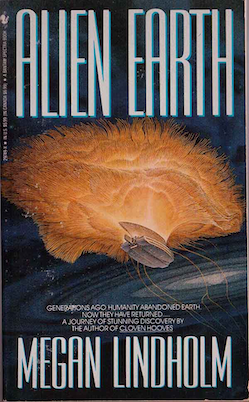
Re-read of Megan Lindholm's (Robin Hobb's) sole science fiction novel. It has two connected plotlines that connect toward the end, and I remembered being way more into one than the other. (A common issue with that sort of plot.) On this re-read, the exact same thing happened. I also was able to identify a weird theme that on previous readings had only made me vaguely uncomfortable.
After humans destroyed the Earth's biosphere to the point that it and they were going to die together, some of the surviving humans were rescued by an alien species, the insectile Arthroplana, who traveled in beastships - enormous, semi-sentient, spacefaring animals, to which the Arthroplana attached some living compartments like barnacles on a whale. The Arthroplana deposited the humans on a spare planet which they were allowed to live on with the condition that they not damage its environment.
During the exodus from Earth, one man, Raef, was disqualified from leaving Earth as he had cancer. But he managed to smuggle himself aboard the beastship Evangeline, who was smarter than the Arthroplana realized. She concealed him within herself, extending his life with long periods of hibernation, during they both participate in a kind of dreamworld mostly based on Raef's memories of childhood and every work of fiction he's ever known. As he's always been very imaginative and given to spinning out pre-sleep fantasies for himself, it takes him a long time to realize that Evangeline is real and not a figment of his imagination - let alone who she really is. When he does figure it out, he also realizes that she's an intelligent being enslaved by the Arthropoda - and specifically by her ship's master, an Arthropoda nicknamed Tug.
This plotline is my favorite. It's got drama, it's got comedy, it's largely composed of dreamlike metafiction, and it has Evangeline first becoming more human and then, as she awakens into her true self, more alien. It's also a beautiful, strange love story culminating in a lovely final page. When I thought back on the book, this was about 90% of what I remembered about it.
There's another story too, which has more pagetime. In the hundreds of years that have passed since Raef boarded Evangeline, the Arthropoda have been genetically and culturally manipulating humans. This part is a weird dystopia based on environmentalism gone mad!
Ostensibly to ensure that humans don't trash the ecology of their new planet (but also so the Arthropoda can more easily enslave and exploit them), they are genetically engineered to delay puberty until well into adulthood, made smaller, fed a strictly vegan diet oh noes, and not allowed to alter the natural environment AT ALL. Every scrap of waste is recycled, every fruit plucked must be compensated for with fertilizer, etc. Also, fiction is banned.
John and Connie, a pair of traumatized-by-evil-environmentalism pre-pubescent adults, ship out aboard the Evangeline to check out the supposedly devastated Earth.
( Read more... )
So, is this worth reading? Well, yes and no. Half of it is pretty great. The other half is a dystopia on the theme of "too much environmentalism is bad actually," which I rolled my eyes as that's not REMOTELY an actual problem in the real world, so it lacks the resonance of "if this goes on..." I also can't help rolling my eyes at dystopias where fiction is banned even though that one really is a "if this goes on..." In general, I'm way more into sentient spaceships and humans falling in love via telepathic fanfic than I'm into fiction is banned and the government controls puberty.